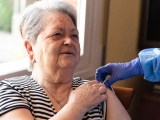Early results are encouraging in young children for a new approach for developing a vaccine against respiratory syncytial virus (RSV), a genetically engineered one that involves a weakened form of the virus, researchers reported yesterday.
A common cause of lower respiratory illnesses in colder months, RSV is the leading cause of hospitalization in the youngest children. A vaccine to make a dent in the disease's burden has been long coveted but has proved tough to develop. Currently, there are about a dozen RSV vaccines in development.
Researchers based at Johns Hopkins University Bloomberg School of Public Health, funded by the National Institutes of Health, developed an attenuated vaccine that they engineered to delete the gene for the M2-2 protein. The deletion allows the vaccine to produce more of the viral proteins that provoke an immune response, but with less infectious virus that causes illness.
They published their findings in an online edition of Science Translational Medicine.
Approach similar to MMR vaccine
The balance that the researchers are seeking is similar that for vaccines against measles, mumps, and rubella. The vaccine virus should be weak enough not to sicken recipients, but strong enough to trigger a protective response.
Ruth Karron, MD, study coauthor and director of the Center for Immunization Research and a professor in the Department of International Health at the Bloomberg School, said in a press release from the university, "From what we have seen in this small preliminary study in young children, this experimental vaccine is working as we hoped it would."
In the trial, investigators sequentially assessed the vaccine in 15 adults, 15 older children (15 to 59 months) who had previous RSV infections, and 30 children 6 to 24 months old who had not been exposed to the virus.
The vaccine is given by nose drops, designed to develop immunity first in the nose, where RSV infection typically begins, then throughout the rest of the body.
The findings suggested that the attenuated vaccine prompted more antibodies in young children than a previous RSV vaccine candidate, with early hints that some children had "booster" responses when exposed to RSV in the community, but without illness requiring medical care.
"These early clinical data are exciting, and make us think differently about the development of live vaccines for RSV," Karron said in the statement. "If this research is borne out in future studies, we could be less than a decade away from a safe and effective live-attenuated vaccine for RSV."
Game-changing solution?
In an accompanying editorial, Anne Moscona, MD, professor of microbiology and pediatrics at Weill Cornell College of Medicine in New York City, wrote that the group's approach is creative and looks promising in infants and young children.
She noted that the challenge in developing RSV vaccines is reaching a balance between viral attenuation and the immune response, but the version in the new study appears to offer a "game-changing solution to the problem of attenuation."
Larger studies will need to be done to sort out questions raised by the phase 1 study, Moscona wrote, adding that live attenuated vaccines won't be appropriate for all people at risk for RSV and that, ideally, clinicians should have several different RSV vaccine options and antiviral drugs to complement them.
See also:
Nov 4 Sci Transl Med abstract
Nov 4 Johns Hopkins press release
Nov 4 Sci Transl Med editorial




















